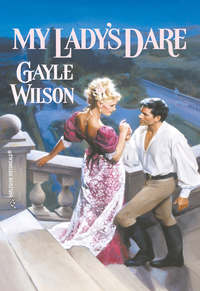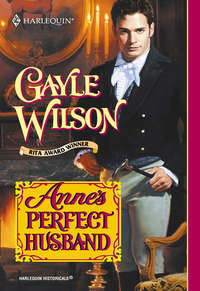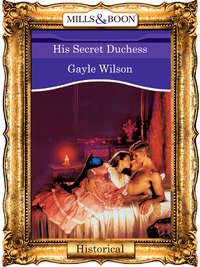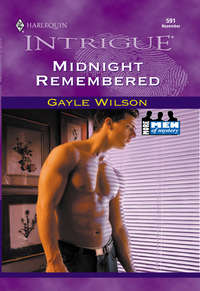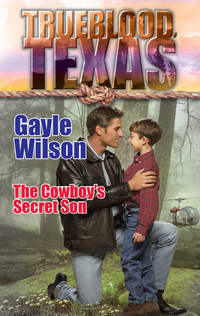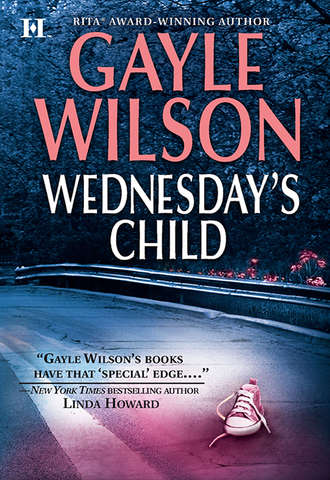
Полная версия
Wednesday's Child
“She would have been strapped in.”
The sheriff shrugged. “Maybe when your husband realized what was happening, he tried to get her out. Maybe he had her free and the current just took her—”
“No,” Susan said.
The single syllable was loud in the afternoon stillness. The scenario he had just suggested wasn’t an idea she was willing to entertain. Not yet.
Adams had already admitted that he didn’t know if the door had been open when the car was pulled from the water. And if it had been, then why hadn’t Richard, an experienced swimmer, gotten out of the car and swum to safety.
Because he was trying to locate his baby in that dark, rushing water? Struggling to unfasten straps he couldn’t see? Trying desperately to get them both to safety?
“I didn’t mean to upset you, Ms. Chandler. I’ll be glad to find out about the doors and the windows. Did you ever think that maybe your husband left your daughter in the care of a relative or some friends? Maybe she wasn’t with him at all when he come down here.”
Did you ever think…
There was literally no one she hadn’t questioned about that possibility. No relative or mutual acquaintance that she had been aware of—and some she hadn’t been aware of until after Richard’s disappearance—that she hadn’t asked about Emma. And about Richard, of course.
None of them had professed any knowledge of their whereabouts. And despite her desperate need for information, there had not been one of them she’d doubted. Now she knew they’d been telling the truth. Richard had contacted no one in the weeks after his disappearance because he had been here, hidden by the waters of this narrow, marshy river.
“When will they be back?”
“Ma’am?”
“The people those belong to.” She tilted her chin toward the cranes on the bank below. “Will they be back out here on Monday?”
“I’m not sure what their schedule is. I can call the main office of Southern Georgia first thing Monday morning. See if I can talk to the men who were here that day. I’ll let you know what they say as soon as I find out. You do understand that nobody had any idea at the time that we ought to be looking for your daughter.”
There should have been a cross-reference to Emma in the national database of missing persons the sheriff had searched for Richard’s name. Apparently that had been another bureaucratic screwup. There had been plenty of those.
Emma had always been listed as an abducted child. Susan had been advised that was the best way to draw attention to her case. Not that she had ever been able to tell it had made any difference. After all, Emma was with her father. And Susan, unaware at that time of how the system worked, had admitted that Richard had no history of mistreating their daughter.
That was the truth, of course, as well as what had kept her sane through the years. But it had lowered the urgency with which the various agencies had responded to her pleas for help.
“I’d like to talk to those men myself, if you don’t mind,” she said, thinking of all the other “comforting” platitudes she’d listened to during those first few months.
There was too much at stake to trust that another set of law enforcement officials would do everything in their power to find her baby. She was no longer as naive as she had once been.
She had been given another chance to find Emma. A chance to right all the things she had done wrong seven years ago.
“In all honesty, ma’am, I don’t think that’s such a good idea,” Adams said. “First place, it’s bound to be upsetting. And those men might not tell you everything they’d be willing to say to somebody who’s not as…emotionally involved in this.”
“Is there a motel nearby?” she asked, ignoring his advice.
That was something else she had done the first time. Listened to all the people who were supposed to know the best thing to do. And look where it had gotten her.
“A motel?”
She couldn’t remember seeing any near the exit to Linton. It seemed there had been only miles and miles of trees along both sides of the interstate, their leaves just beginning to be tinged with color from the fall nights.
“Somewhere I can stay while I’m in town.”
The green eyes widened in surprise, exposing the network of lines at their corners. “Plenty of motels in Pascagoula.”
Which was more than sixty miles away. Despite the fact that most of the distance was state highway and interstate, she didn’t want to make that commute every day. And until she found out what had happened to Emma…
“I mean here. Somewhere I can stay in Linton.”
Somewhere close enough that she could talk to anyone who might have encountered Richard—and please, dear God, encountered Emma—while they were here.
“No motels around here. We had a hotel at one time, but—” The sheriff stopped abruptly, his lips still slightly parted.
“What is it?”
“I was gonna say that the hotel closed due to lack of business once the state highway opened up, but then I remembered Miz Lorena’s.”
“Miz Lorena?” The title the sheriff had used was the old-fashioned Southern one that had nothing to do with women’s rights and a great deal to do with age and respect.
“Miz Lorena Bedford. Got a big ole house a few miles outside the city limits. Tried to make it into one of those bed-and-breakfast places, aiming to get the Yankees heading to the Gulf and the casinos. Once that stretch of the four-lane opened, there wasn’t enough traffic on the Linton cutoff for her to make a go of it. Same thing that happened to the hotel. That’s what made me think of her place.”
“And you think she might rent me a room?”
The sheriff shrugged, looking back down on the river. “Got no idea how she’d take to the idea, but she’s got the space and the bathrooms. Had ’em put in special for all those guests that didn’t show up. It’s worth a try. I can tell you how to get out there. You tell Miz Lorena what you’re here for, and I doubt she’s gonna turn you down.”
Susan nodded, taking a last look at the sluggish current below. She wasn’t going to leave Linton until she had some answers. Maybe that determination was simply a recognition that this place represented her last chance of finding Emma, but in her heart—the one that had been frozen for the last seven years—there was again a delicate flame of hope.
CHAPTER TWO
DESPITE THE SHERIFF’S repeated reference to Lorena Bedford’s “big ole house,” Susan’s first sight of it through the trees was a shock. Classic Greek Revival in style, its graceful columns soared from the porch to the roof of the second story. The structure was situated at the end of a long, unpaved driveway, bordered by two perfectly spaced rows of oaks, strands of picturesque Spanish moss hanging from their low branches.
She slowed the car as she made the turn onto the property. The rays of the dying sun touched the white paint with gold and shimmered off the glass of the front windows. The house looked like some Hollywood producer’s fantasy of the antebellum South.
As she approached, reality was less kind. There were areas of flecked paint on the Doric columns, and the side veranda was devoid of furniture. The foundation plantings were neatly trimmed, however, and the grass, although not closely mown, was still, despite the season, thick and green.
The driveway circled around a garden, which had been planted directly in front of the steps leading up to the front door. A few of the small old-fashioned roses that comprised most of it were, surprisingly, still in bloom.
She pulled her car parallel to the steps and shut off the engine. Before she got out, she sat a moment in the twilight stillness. The murmur of insects could be heard from the surrounding woods. There were no other sounds. No traffic out on the two-lane she’d followed here. Not even the small-town noises she’d been aware of in the hours she’d spent in Linton.
She opened her door, stepping out again into the heat and humidity. She had discarded the jacket to her navy linen suit before she and Adams had gone down to the river. She thought about retrieving it from the back seat and then decided the temperature should preclude any such attempt at formality.
She brushed her hands over the wrinkles on the front of her skirt, deciding that, too, was a lost cause. Miz Lorena would just have to take her—or leave her—as she was.
Her keys still in the ignition, she walked around the front of the car and climbed the steps. Her heels echoed as she crossed the wooden boards of the porch.
The front door was open, probably as a concession to the late-afternoon heat. She tapped on the molding of the screen door, the sound echoing down the inside hallway she could see only dimly. She waited, politely looking at the roses beyond her car rather than watching for someone to answer her knock.
After a few moments without any response, she turned back to the door. She could hear no movement from inside the house. She cupped the outside of her hand against the screen, peering in under her arched palm.
Was it possible no one was home, despite the open door? Of course, the screen might be latched. Maybe this far out of town that was considered protection enough against intruders. She touched its frame, pulling the door toward her just enough to determine that it wasn’t fastened.
She let the screen slip back into place and again tapped on its molding. Although she tried to apply more force than before, the resulting sound didn’t seem appreciably louder.
This time she watched the hallway as she waited. Again there was no response.
She should have phoned before she drove out. The sheriff hadn’t suggested that, and, as he apparently had, she’d assumed the old woman would be home.
Despite the fact that the hotel in town had closed, she had noticed a café on the square. She could drive back into Linton, look up the Bedford number and place a call from there. Actually, she would probably be wise to have dinner in town, she realized. Even if Miz Lorena agreed to rent her a room, the sheriff hadn’t said she would also be willing to provide meals.
Decision made, Susan crossed the porch and descended the front steps. Her hand had already closed around the handle to the car door when a creak announced the opening of the screen.
Her eyes were drawn back to the porch. Since her arrival the daylight had faded enough that, under the overhang of the second-floor balcony, the area was now as dark as the interior hallway had been. She could see a figure in the open doorway, but little else.
“Mrs. Bedford?”
“She’s not here.” The voice was masculine, its accent not local, and its tone decidedly unwelcoming.
“Could you tell me when she’ll be back?”
The pause after her question stretched far past politeness. So much for Southern hospitality.
“That depends on who wants to know.”
Susan controlled a spurt of anger at the man’s rudeness, acknowledging most of that was due to emotional exhaustion rather than his treatment of her request. After all, she’d shown up here without so much as a phone call asking permission.
Mrs. Bedford’s house was no longer a commercial establishment. It was someone’s home. And she needed a favor from the owner. Whoever this was, he might be able to exert some influence in that direction.
“My name is Susan Chandler.” She tried to make her voice as pleasant as possible, considering the circumstances. As she talked, she walked back around the front of the car and headed toward the steps. “I had hoped Mrs. Bedford might rent me a room for a few days. I’m aware she’s no longer in business—”
“Then why ask to rent a room?”
He had apparently turned on a light in the front of the house as he’d come to the door. His body was silhouetted against its glow, wide shoulders almost filling the frame.
Looking up at him from the foot of the steps, Susan’s impression was that he was also taller than average. In spite of the width of his shoulders, his torso narrowed to a lean waist and slim hips. She could still see nothing of his face.
“Because Sheriff Adams suggested I ask her. It’s…”
She let the sentence trail. She might have been willing to try and explain her compulsion to stay in town to another woman, but something about this man’s attitude made her doubt he would sympathize with anything she might say.
“It’s what?”
“Are you a relative of Mrs. Bedford’s? Or…”
A guest? The yardman? As she tried to settle on a second option, he made the process unnecessary.
“You seem to have a proclivity for unfinished sentences.”
Obviously not the hired help. Not unless handymen were better educated down here than she was accustomed to. And just as obviously determined to be rude.
“My husband’s body was pulled from the river here two days ago,” she said, deciding she had nothing to lose by a matching bluntness. “I need a place to stay until the coroner can tell me how he ended up there.”
The silence stretched longer this time. In the few minutes she’d been here, the night creatures had joined the insect chorus, the combined noises the only sound for several seconds.
“I’m Jeb Bedford. Lorena is my great-aunt,” he said. “At the moment I’m also her guest—a paying one, in case you were wondering.”
She hadn’t been. She didn’t give a damn about whatever arrangements he had with Lorena Bedford.
Actually, she was beginning not to give a damn about any of this. The commute back and forth to Pascagoula was becoming more appealing by the second.
“Lorena’s gone to the monthly fellowship supper at the church. Judging by previous ones, she should be back in less than an hour.” His tone had changed. Still not welcoming, it didn’t contain the edge of sarcasm. “If you’d like to wait.”
Would she? A better question might be whether there would be any point. After all, she still didn’t know that Mrs. Bedford would rent her a room.
“Actually…” she began, and then hesitated, unwilling to burn any bridges. Of course, she also didn’t want to be reminded of her so-called proclivity for unfinished sentences. “I’d rather not wait if she’s likely to turn me down. If I’m going to have to try to find a room in Pascagoula on a Friday night, I should probably get started in that direction now.”
“Lorena’s not going to turn you down. Not…under the circumstances. However, you might want to see the accommodations before you decide. What some people consider quaintly charming, others view as not having all the modern conveniences. All the rooms have private baths. And despite the area’s reputation, those are inside the house.” There was a hint of amusement or self-deprecation in that, but no sarcasm. “No coffeepots or microwaves, but with Lorena around you aren’t likely to need either. She enjoys waiting on people.”
Which sounded more inviting right now than he could probably imagine.
“The beds have feather mattresses,” he went on. “Not orthopedically sound perhaps, but you soon get used to them.”
He certainly seemed to have changed his tune. She hadn’t intended to play the grieving widow, but he’d driven her to it. Given the results, right now she couldn’t regret that she had.
“She should hire you for PR. You’re quite a salesman.”
“I couldn’t sell ice in hell, but frankly Lorena can use the money. If you’re going to spend it somewhere, it might as well be with her. Do you want the grand tour or not?”
The abrasiveness was back. For some reason her remark, intended to be humorous, hadn’t had the desired effect. So much for trying to mend fences.
“With you as guide?” she couldn’t refrain from asking.
Something of her irritation must have come through in the question. He responded in kind.
“Since I’m all that’s available. Take it or leave it.”
Her inclination was to tell this arrogant jackass what he could do with his aunt’s room. Only the knowledge that she would be cutting off her own nose prevented her from getting back into her car and heading toward the interstate.
“Lead the way,” she said, stepping onto the bottom step.
The screen door creaked again. She glanced up in time to watch him step back into the hallway. Although she was aware there was something awkward about the movement, it was not until he was inside and illuminated by the overhead chandelier that she understood what. He moved a couple of steps back in order to allow her to enter, heavily favoring his left leg.
Despite the fact she had continued to climb the steps as if nothing had happened, an unfamiliar emotion stirred in the pit of her stomach. Guilt, perhaps, that she’d returned his rudeness with her own? Embarrassment? Pity?
As he held the screen door for her to enter, she kept her eyes averted, examining the hallway instead of looking directly at him. The floor was of some dark wood that had been fashioned into narrow, irregular planks. It was probably a dozen feet wide and stretched into the darkness at the back of the house.
Pocket doors opened onto a formal parlor on one side and a dining room on the other. Both were furnished in keeping with the age of the house. In the sitting room an old pianoforte sat in the corner. Several pieces of sheet music were scattered on its stand and on the upholstered bench.
“When Lorena operated the house as a bed-and-breakfast, all the downstairs rooms were available for the use of the guests,” her guide said. “I’m sure that will still be the case.”
With his comment, there was no way Susan could avoid looking at him. She turned, prepared to make some politely conventional reply. All of them, instilled in her brain since childhood, flew out of her head.
She wasn’t sure what she had expected Mrs. Bedford’s great-nephew to look like, but certainly nothing like this. His close-cropped hair was so black the chandelier over their heads created no highlights in its midnight depths. In contrast, his eyes were a deep, clear blue. Black Irish, her grandmother would have said. Given the strong Celtic heritage of most of the South’s population, in this case she would probably have been right.
His skin was almost as darkly tanned as the sheriff’s. It didn’t have the same weathered texture, but then this man was probably a decade or so younger. Although Jeb Bedford wasn’t handsome in any conventional sense of the word, no woman would ever have overlooked him in a crowd.
She suddenly became aware that her lips had parted to reply to what he’d said, but no words had yet emerged. She was simply staring at him, stupidly open-mouthed.
“That’s nice,” she managed.
He was probably used to having this effect on women, she thought with a trace of disgust. She, however, wasn’t accustomed to reacting to a man in this way. Not to any man. And certainly not in this situation.
She owed no loyalty to Richard, of course. He was the one who had walked away from their marriage. The sense of guilt her attraction to this man’s rugged good looks produced was because she had something far more important to concentrate on right now—her desperate need to find out what had happened to Emma.
“The guest rooms are upstairs.”
He tilted his head down the hall to where a narrow staircase climbed to the second floor. It was uncarpeted, its wooden treads visibly worn from the passage of thousands of feet going up and down them through the years.
“How old is the house?” she asked, more as an attempt to get back on some normal footing with him than because she had any real interest in its history.
He had already taken a step forward, but at her question he turned, looking back at her over his shoulder. “It was built in 1852. It’s been in the hands of the family ever since. When Lorena dies…” He shrugged a dismissal.
“But surely there’s someone—”
“My grandfather and Lorena were joint heirs to the property. Now that he’s dead, there is no one else.”
“Perhaps your father…” He was right, she realized. She did have a proclivity for not finishing sentences, maybe because she always seemed to be stating the obvious.
“My father died two years ago. He and my mother were divorced several years before that. Believe me, she wouldn’t have anything to do with this place. Or with the Bedfords.”
This time she avoided the obvious reply. Whether or not he chose to sell the house or to let it go to rack and ruin when his great-aunt died was none of her business. She wasn’t even sure why she had bothered to pursue what he’d said. Maybe to postpone the moment she would have to follow his limping progress up the stairs.
“I…I really don’t need to see the room,” she stammered. “I’m sure it’s fine. After all, from what the sheriff told me, there isn’t any other accommodation near town.”
The blue eyes told her that he knew exactly what she was thinking. They held on her face long enough that she felt color rise along her throat.
“You have a bag?” he asked, finally breaking the standoff.
Ridiculously, for a second or two she didn’t know what he was talking about. “It’s in the car.”
“Then if you’re going to take the room, I might as well get it before I show you up. Keys?”
Whatever she had seen in his eyes when she’d attempted to keep him from having to climb those stairs was back. In force. Challenging her to make another excuse.
That wasn’t a mistake she would make again. Whatever was wrong with his leg, he obviously didn’t want her concern.
And in all honesty, despite the limp, he looked like someone who was well able to take care of himself. Someone who was accustomed to doing that.
“They’re in the ignition. My suitcase is in the trunk.”
For an instant there was a gleam of something that looked like approval in his eyes. Whatever the emotion, it was quickly masked by a downward sweep of coal-black lashes. They weren’t long, but both their thickness and their proximity to the blue irises made them noticeable.
Without another word, he started down the hall toward the front door. As he passed her, Susan pretended to look up the stairs as if the bit of the second story she could see from this vantage point was so interesting she couldn’t pull her eyes away. Then, drawn by a compulsion she didn’t pretend to understand, she turned, watching him limp toward the door.
She’d been right about the breadth of his shoulders. The damp material of the olive-drab T-shirt he wore stretched tautly across them, revealing the contoured muscles of his upper back. The shirt was tucked into a pair of faded black sweatpants.
Despite whatever was wrong with his leg, he looked like an athlete. She wondered if he might even have been working out when she’d disturbed him. That would explain the V of moisture at the neck of his shirt as well as the slight color along his cheekbone and dew of perspiration she’d put down to the heat.
“Only one?”
Startled, she looked up from her contemplation of the play of muscle in his back to find him looking at her over his shoulder, waiting for an answer before he opened the screen door. It must have been obvious that she’d been watching him.
He seemed amused by her scrutiny rather than annoyed. For the first time the hard line of his mouth was relaxed.
“Just the one.”
“First room on the right,” he said. “I’ll bring the suitcase up, but you don’t have to wait.”
She wasn’t sure why, but the instructions felt like a reprieve. At least a concession. As if she had just passed some kind of test and earned a grudging acceptance.
“Thank you.”
“You want me to move your car around back?”
She hesitated, wondering if she’d missed a sign indicating that’s where guests were supposed to park.
“Don’t worry,” he said when she didn’t answer immediately. “As long as it’s an automatic, I shouldn’t be able to do too much damage.”
“I’d be very grateful,” she said, ignoring the attempt to intimidate her with the blatant reminder of his disability. “And it is an automatic. I never learned to drive a stick.”
There was a slight upward movement at one corner of his mouth. “Somehow I was sure you hadn’t.”




